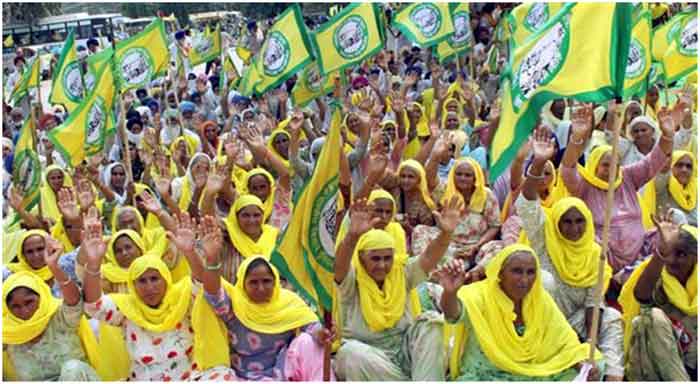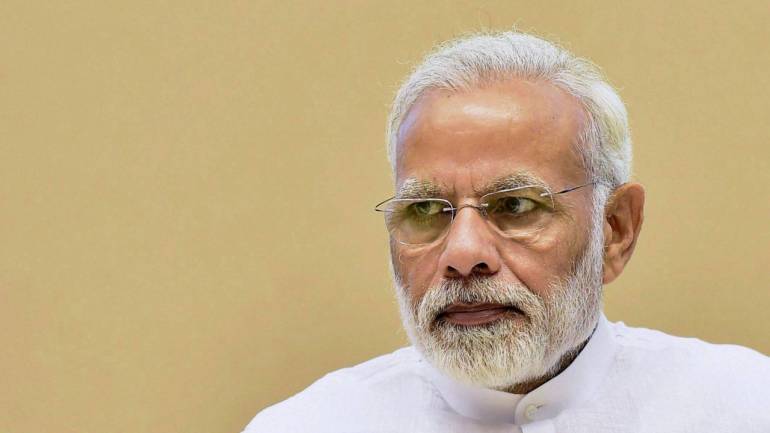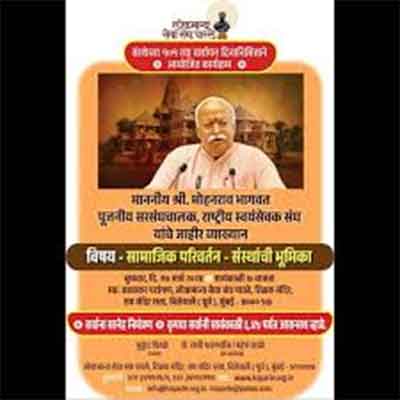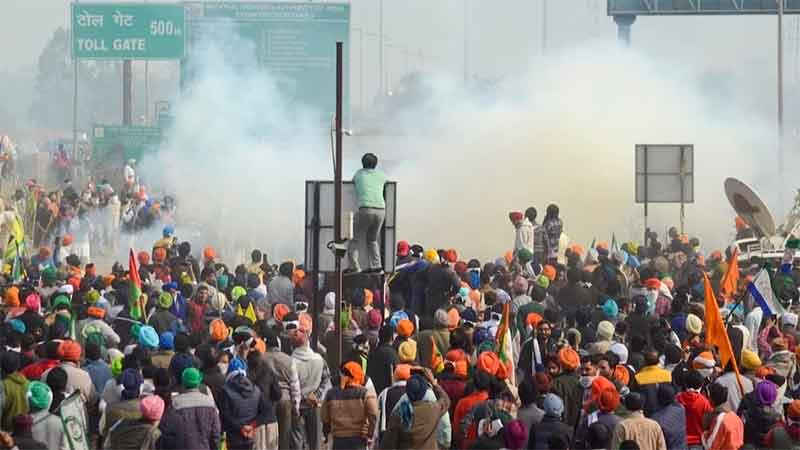
In the context of a massive farmer agitation to protect the agrarian productive mass self-respect and future of their age old occupation, it is important to see whether the ruling Rastriya Swayamsevak Sangh ideology has any scope for developing agriculture as against its pro-business ideology. If one looks at the policy documents of the RSS right from 1925 it’s Cultural Hindutva Nationalism, they do not show any evidence of scientifically formulating agrarian development policy. It has its strong ideological roots in Manu Dharma and Kautilya’s Arthashastra economic ideology which were anti-agrarian in essence.
The parampara of Kautilya and Manu were continued by Savarkar and Golwalkar through their writings in modern times. The Hindutva school with an overt ideology of enmity to Islam covertly structured its ideology as an anti-agricutlturist. Though constructed their ideology in terms of nationalism advancing agrarian production was never part of their discourse. Of course this is also true of Muslim organisations and political parties like All India Jammat-E-Muslimeen headed Asaduddhin Owai or the Welfare Party Of India which is run by Jamaat Islami Hind. Any religious organization or party had any history of focussing on agrarian production and farmers interests. Now that RSS/BJP are ruling India and framed anti-fatermers laws we need to see their history more carefully.
One can see this from the output of the RSS ideological journals like Panchajanya, Organiser and their research organizations like Vivekananda International Foundation that their focus never has been Indian agriculture. Positive reform and development of agriculture in competition with neighbouring China, which they always hated, whether it was communist or not was never their focus. They silently even in the post-Mandal period worked with spiritual and business networks of India. Kautiya, more particularly Manu condemned agrarian mass as Shudra unworthy to be treated as humans. The RSS and its political wing the Bharatiya Janata Party never disassociated with that ideology. The present farm laws reflect only that anti-agriculturalist philosophy.
How can Narendra Modi and Amit Shah bring a progressive agriculturist philosophy which does not exist in their diction? Their pro-business, small or big, has been their parampara. How does that parampara change from Delhi power within a few years? Their think-tanks do not show any such shift in ideology. Not a single organization controlled and run by RSS/BJP shows their willingness to distance itself from Manudharma which is an anti-food producer philosophy.
This is what Manu told the Shudras who are the main food producers to do. Their work in agriculture was never seen as work.
- 123. The service of the Brahmanas alone is declared to be an excellent occupation for a Shudra; for whatever else besides this he may perform will bear no fruit.
- 129. No collection of wealth must be made by a Shudra, even though he is able to do it; for a Shudra who has acquired wealth gives pain to Brahman.
In China, a nation that the Hindutva forces never studied, there was a philosophical school called Agriculturism between 770 BCE and 221 BCE. The main philosopher, who represented this school with a sophisticated exposition of that philosophy, was Xu Xing (372-289 BCE). His main philosophy was that people’s propensity is based on farming more than to any other thing. By the third and the fourth century BCE the Chinese society had come out of pastoralism and firmly moved into agrarian production with a backup of a strong philosophy of agriculturism. In Xu Xing’s philosophical domain agriculturist was known as ‘divine farmer’. The divine farmer was treated with higher esteem than the religious preacher.
In India farmers never got such a stature because of the anti-agriculturalist philosophy brahminism. A Brahmin saint who does not know what is agriculturism was given a greater place in agrarian society also. The agriculturists were designated as Shudras by Brahmin saints and they were never allowed to acquire philosophical and respectful divine status. The Shudras had evolved their own agrarian spiritual deities but those deities were shown as unworthy in the brahminic literature. Thus production itself was rendered unworthy and it was not allowed to acquire philosophical significance.
Once the Brahminism constructed Shudras as slaves and forced them to remain illiterate their philosophical growth was arrested. The Brahminic Vedas, Upanishads, Ramayana, Mahabharata, Kautilya’s Arthashastra and Manu’s Dharmashastra have no discourse on agriculturism and every writer in India treated these books as a source of Indian civilization and culture. All these books have nothing to do with agriculturism. The RSS/BJP ideological Indian cultural heritage is not taken from agriculture, as it was never seen as part of culture. Culture for them existed only in the brahminic texts.
From 3rd century BC to 1st century AD when agriculturism would have developed with some kind of agrarian production Kautilya’s Arthashastra and Manu’s Dharmashastra were written by devaluing agrarian production. Farmers in India were never allowed to become divine farmer. Brahminism promoted unsocial, caste practicing saints and sanyasis as the ultimate model of Indian cultural heritage, who have no role in production and agriculturism.
The Shudra farmers were not allowed to develop their own alternative thought. The first Shudra thinker who asserted the importance of agriculture and farmer were Mahatma Jotirao Phule in the mid 19th century. Phule realised that the Shudras were denied of a philosophical status and were reduced to the status of gulam (slave). No slave could construct a philosophical school of his own, so long as s/he remains slave. Hence he wrote Gulamgiri (Slavery) putting the Shudra farmer in the central. However, his thought did not develop into full-fledged agriculturism like the Chinese school of thought because he had no historical heritage of building up a school of thought with a series of writings. Without a systematic writing no school of thought would develop.
Ever since Vedic texts were written the pre-Vedic agriculturism that developed in Harappan civilization was set aside because agriculturism essentially survives as Xi Xing emphasises on farm production, communitarianism and egalitarianism. Indian Brahminism inherently opposed communitarianism, as communitarianism plays a key role in the advancement of agriculturism. Communitarianism would not allow the caste culture to operate in any field of life. Since Vedism brought in four fold varna (caste-class) division which is not even based on division of labour but based on spiritual and social authority over the Shudras who were the mainstay of agriculturism, that division negated progress of agriculturalism.
The RSS/BJP forces continue the Vedawada without allowing Phule’s philosophy of agriculture to an advanced level. A serious debate about real ancient roots must be brought up by relocating in our pre-Vedic agriculturism. If the farmer’s agitation stops just at withdrawal of the three farm laws not much will change. The children of farmers must get into good English medium education in Government schools also to grasp and reclaim ancient Indian civilization from the days of Harappan agriculturalism. And our schools, colleges and universities must be reshaped with an hegemonic idea of Indian agriculturalism.
If the RSS/BJP forces oppose such a change towards better growth, better market in the agrarian sector under the leadership of peasant youth in the universities, a real battle for Aazadi will start.
Kancha Ilaiah Shepherd is a political theorist. His new book The Shudras-Vision for a New Path co-edited with Karthik Raja Karuppusamy , Penguin will be out soon
SIGN UP FOR COUNTERCURRENTS DAILY NEWSLETTER
















































